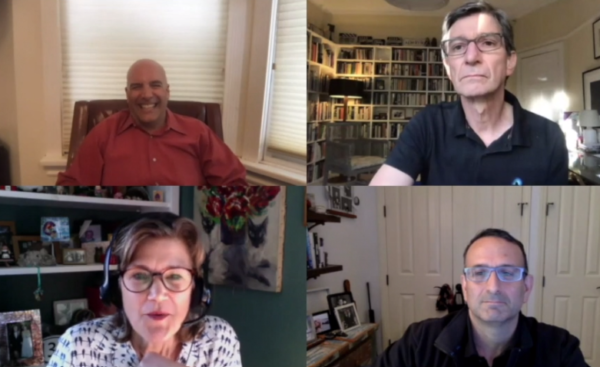M+E Connections

Industry Collaboration is the Key During the Pandemic and Beyond
Story Highlights
As the impact of COVID-19 on the global production community settles into a “new normal,” we’ve seen an exponential increase in the adoption of tools, technologies and workflows that exist in a more fluid, instant and “always on” infrastructure.
Through it all, the importance of industry collaboration has become more important than ever as the media and entertainment industry continues to try to overcome challenges created by the pandemic and looks to return to business as usual at some time in the near future, according to a few industry groups that are playing a critical role in how we tackle increasingly challenging production and distribution models.
The Hollywood Professional Association (HPA) focuses on “three pillars of activities,” which are community, knowledge exchange and recognition, according to Seth Hallen, its president.
Its board has been meeting on a weekly basis throughout the pandemic “to consider all the things we can do to support our community” as everything keeps changing quickly, he said May 12, speaking during the virtual panel presentation “Setting the Standards and Systems for Remote Access and Back to Work” at the Cybersecurity & Content Protection Summit (CCPS), held digitally as part of the NAB Show Express experience.
Now is the time for all organizations in the sector “to work together and make sure there’s no redundancy” with their activities and initiatives because “we don’t have time” for all that now, he noted. “Now more than ever, as far as we’re concerned at the HPA, the industry needs what we’ve always delivered, which really [are] forums for communication and collaboration and education,” he said.
HPA recently launched the HPA Industry Recovery Task Force, and one of its initiatives is “helping to foster education and collaboration in remote workflows and post production,” he told viewers.
 While announcing the Task Force in early May, Hallen said: “Our focus is to understand how to get our industry back to work and how to do it in a way that provides an ability to not only safely create global content, but to also understand the long-term impact to workflows, technology as well as to the people and our business community as we navigate through these unprecedented times.”
While announcing the Task Force in early May, Hallen said: “Our focus is to understand how to get our industry back to work and how to do it in a way that provides an ability to not only safely create global content, but to also understand the long-term impact to workflows, technology as well as to the people and our business community as we navigate through these unprecedented times.”
Noting during the May 12 online presentation that the Society of Motion Picture & Television Engineers (SMPTE) was started in 1916, two years before the Spanish flu pandemic started, Barbara Lange, its executive director, pointed out pandemics are “something that we have some history in and have survived, and we do hope that we will survive this as well and also help the industry.”
While SMPTE has been working for the past 2-3 years “very actively in software domain,” she said it’s been meeting online and using online collaborative tools. The pandemic is managing to “accelerate” SMPTE’s “push into that area even more aggressively,” she said, adding: “In some respects, we’ve laid the groundwork over the last couple of years and I think this will just continue to move in that direction”
SMPTE’s 2110 standard around moving pro video over IP networks is “also accelerating,” she said, adding its next set of standards block meetings will be virtual.
Noting that the Digital Production Partnership (DPP) is “just five years old” with about 400 member companies around the globe, Mark Harrison, its managing director, said it focuses on three areas: Technology, working very closely with SMPTE around specifications and best practices; research and insight work; and a lot of events, although they are all online now.
Harrison, meanwhile, expects to see an “interesting tension all around the world… between what governments and regulatory bodies… may be asking businesses to do and kind of what businesses themselves start to feel like they need to do” as the industry looks to return to normal. Sometimes businesses will be more cautious, he noted. But he added: “We’re going to see production really push it because, man, they really need to get back to work. And they are looking at the rules and regulations and they are looking at how they can duck and dive” to continue making content.
“I don’t like this phrase new normal,” he added, saying “I think it’s really unhelpful because it sort of suggests a homogeneity and there’s never a normal anyway.”
Despite the social distancing we’ve all been taking part in through the pandemic, technology is bringing “humanity back” to some degree, according to moderator Guy Finley, president of the Content Delivery & Security Association (CDSA) and Media & Entertainment Services Alliance (MESA). “Even though we can’t be physically together, I’m learning more about everybody” through these video conferences in which he and others are sharing screens, he said. “My hope is that technology will bring us all closer together as people and as humanity in light of everything swirling around us that’s going on,” he added.
Asked what she was hoping for, Lange, said she was “excited about the opportunities that we can build upon to focus on what’s important in life and to make us better.”
“What we’re seeing is actually that everybody’s experiencing how different people work in different situations [and] the “notion that you have to work in one way in one place is being bust open,” Harrison said. As a result, employers will be more sympathetic to those looking to work in a slightly different way than they have traditionally done, he predicted. It is “going to be empowering and it’s going to drive change because diversity always drives change and creativity,” he added.
And Hallen said: “It’s hard to get excited about anything right now” because there are so many people out of work or dying. “Certain things won’t survive. Other things that exist will actually grow bigger and thrive. And then there’s going to be an opportunity for new things to grow. I do believe that when we come up the other side of this… there’s tremendous opportunity for technological innovation, new workflows, new products, new services.”
Presented by Richey May Technology Solutions, with sponsorship by Akamai, Cyberhaven, Microsoft Azure, SHIFT, Convergent Risks, and the Trusted Partner Network (TPN), the Cybersecurity & Content Protection Summit focused on the latest cybersecurity and content protection challenges studios, broadcasters and vendors alike are facing during the ongoing pandemic.
Produced under the direction of the CDSA Board of Directors and content advisors representing Amazon Studios, Adobe, Paramount, BBC Studios, NBCUniversal, Lionsgate, WarnerMedia, Amblin Entertainment, Legendary Pictures, and Lego Group, this year’s Cybersecurity & Content Protection Summit looked ahead at the challenges facing the security community in 2020 and beyond.









